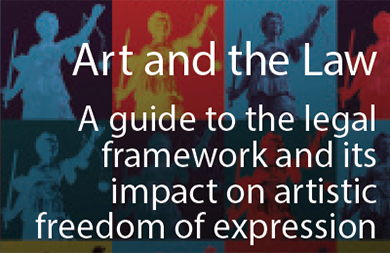31 Jul 18 | Artistic Freedom, News and features, United Kingdom
[vc_row][vc_column][vc_gallery interval=”3″ images=”101853,101849″ img_size=”large”][vc_column_text]Dressed in t-shirts and sneakers, a group of teens files into a large, white-walled room reminiscent of a school gymnasium. A stage looms over a motley audience of chairs, its walls plastered with handmade collages of redacted newspaper headlines. It could be any summer programme, but when professional opera singer Abigail Kelly begins leading the students in a song on political dissent and dictatorship, it’s clear that they’ve come together to create something novel, provocative and, above all, youth-led.
This is the English National Opera’s (ENO) Baylis Summer Youth Project, which invites students ages 13-18 from around London to create and perform a new piece of music theatre with the support of professional directors, composers and performers. This summer’s programme challenges participants to think critically about issues of censorship, both modern and historical.
The programme responds to Effigies of Wickedness, a collaboration between ENO and the Gate Theatre. Effigies presented songs censored and banned by the Nazis in the 1930s. The youth project features these songs which were, as assistant composer Kelly rehearsed in one scene, “degenerate music […] especially music written by Jewish composers.”
Previous projects have included Other Voices and Speak Some Truth. Like this year’s project, they responded to ENO productions, helping students break down complex topics related to expression and connect them to their own experiences and the present day. Brainstormed by participants and revised by professionals, the script reflects their discussions on censorship. Participants then split into performance and set design groups to put the performance together in late July.
Three performance group members outlined the creative process:
“First we got quotes on censorship and drew a mind map of our ideas” said Alanis.
“We talked a lot about censorship and self-censorship” said Hugo, adding that he hadn’t really thought about self-censorship and how it affects his own interpersonal interactions before the program.
Another participant, Elizabeth, noted “We were also given a poem explaining the fine line of free speech.”
Kelly mentioned that when students came together in mid-July, programme leaders stimulated their thinking about the intersection of free expression and the arts with poetry from persecuted artists like Palestinian poet Darine Tatour. Index CEO Jodie Ginsberg also spoke to the youth company on the programme’s opening day to stimulate discussion on free expression in the arts.
Diversity and teamwork are at the centre of the programme. Choreography is crowd-sourced from the performance group members and all the costumes and stage decorations were built by the set design team. Across the stage, newspaper collages bear hand-painted slogans like “Answer bad ideas with ideas, not censorship” and “Censorship reflects society’s lack of confidence.” Kelly said “We try to give the participants a sense of ownership over what they’ve created.”
Assistant producer Poppy Harrison sees the program as “An opportunity to discuss things in a different way, […] to show every side of the argument. We’ve been careful not to push [the participants] in any direction.”
ENO Baylis’ outreach began during the school year in communities with limited access to the arts. Students in ENO programmes like Opera Squad were especially encouraged to apply to the summer session. Culminating in a performance in front of friends and family, the programme is an extension of ENO’s mission to inspire students to engage with the opera and pressing issues like censorship in the arts.
With participants like Hugo observing that the programme helped him realise that “Creators are people still censored even in our democratic society,” it would seem that ENO is succeeding.
Index on Censorship works extensively on issues of artistic freedom. Find more information here.[/vc_column_text][/vc_column][/vc_row][vc_row][vc_column][vc_basic_grid post_type=”post” max_items=”4″ element_width=”6″ grid_id=”vc_gid:1533049608412-e4e98e79-eb23-5″ taxonomies=”1856, 25039, 13149, 1167″][/vc_column][/vc_row]
19 Jul 18 | Artistic Freedom, Events
[vc_row][vc_column][vc_single_image image=”96667″ img_size=”full” alignment=”center”][vc_column_text]
Risks, Rights & Reputations (RRR) is a half-day training programme developed by Index on Censorship, What Next? and Cause4 to provide arts and cultural leaders with the guidance, inspiration, tools and resources to navigate the rights and responsibilities of producing challenging or socially sensitive work.
Challenging a Risk Averse Culture
“In recent years there have been an increasing number of high-profile cases raising ethical and censorship issues around plays, exhibitions and other artworks. Censorship – and self-censorship – can stand in the way of great art. That’s why Arts Council England is committed to supporting those organisations who are taking creative risks. It’s important that organisations are aware of relevant legislation and the excellent guidance that exists. This programme is an important step in ensuring that our sector can continue to create vital, challenging, and risk-taking work.” – Sir Nick Serota, chair of Arts Council England
Navigating the rights and responsibilities of art that explores socially sensitive themes can appear daunting, risky and time-consuming. We have seen work cancelled or removed, because it was provocative or the funder controversial. But, for arts and culture to be relevant, dynamic and inclusive, we have to reinforce our capacity to respond to the most complex and provocative questions.
“This important and necessary project is a great opportunity to learn and discuss with others the increasing challenges we face in the arts sector, particularly in the context of socially engaged practise and public spaces.” – Mikey Martins, Artistic Director and Joint CEO, Freedom Festival Arts Trust
Session Content
The session addresses the challenges and opportunities related to artistic risk and freedom of expression. It aims to encourage participants to voice concerns and experiences within a supportive environment and programme of presentations, discussion and group work. By the end of day participants will:
- Understand the legal and rights framework supporting artistic freedom in the UK;
- Learn from analysis of recent controversies in the arts;
- Gain confidence in decision-making and planning for potentially controversial work;
- Manage expectations relating to the role of the police;
- Discover the value of creating an ethical fundraising policy;
- Benefit from access to new tools, resources and ongoing support from peers and experts beyond the session.
Participants
The session is open to artistic directors, CEOs, Senior management and trustees of arts organisations.
To date, RRR sessions have been delivered in Manchester, London and Bristol, with Arts Council national and regional offices and in partnership with the Freedom Festival Arts Trust, Hull.
“I feel more confident to speak up when talking to leaders about policy, process and practice when it comes to issues around artistic risk-taking / freedom of expression and ethical fundraising. I feel more empowered to be a useful, knowledgeable sounding board for the organisation’s I support than I did previously.” – Relationship Manager, Arts Council England[/vc_column_text][/vc_column][/vc_row][vc_row css=”.vc_custom_1510749691901{padding-top: -150px !important;}”][vc_column][vc_separator][vc_column_text]
UPCOMING TRAINING
We are currently accepting bookings from CEO/Artistic Directors, Chairs, individual Board Members and senior team members across the country for our upcoming RRR training sessions:[/vc_column_text][vc_row_inner][vc_column_inner width=”1/6″][vc_column_text]Date[/vc_column_text][/vc_column_inner][vc_column_inner width=”1/6″][vc_column_text]ACE Region[/vc_column_text][/vc_column_inner][vc_column_inner width=”1/6″][vc_column_text]Venue[/vc_column_text][/vc_column_inner][vc_column_inner width=”1/6″][vc_column_text]Host[/vc_column_text][/vc_column_inner][vc_column_inner width=”1/6″][vc_column_text]Trainers[/vc_column_text][/vc_column_inner][vc_column_inner width=”1/6″][vc_column_text]Tickets[/vc_column_text][/vc_column_inner][/vc_row_inner][vc_row_inner][vc_column_inner width=”1/6″][vc_column_text]15 November 2018, 12:30 – 17:30 [/vc_column_text][/vc_column_inner][vc_column_inner width=”1/6″][vc_column_text]London[/vc_column_text][/vc_column_inner][vc_column_inner width=”1/6″][vc_column_text]Young Vic Theatre[/vc_column_text][/vc_column_inner][vc_column_inner width=”1/6″][vc_column_text]Kwame Kwei-Armah (Artistic Director)[/vc_column_text][/vc_column_inner][vc_column_inner width=”1/6″][vc_column_text]Julia Farrington, Index on Censorship;
Michelle Wright, Cause4
Diane Morgan, director Nitrobeat[/vc_column_text][/vc_column_inner][vc_column_inner width=”1/6″][vc_column_text]From £25. Book tickets for the Young Vic Theatre session[/vc_column_text][/vc_column_inner][/vc_row_inner][vc_row_inner][vc_column_inner width=”1/4″][vc_single_image image=”103263″ img_size=”full”][/vc_column_inner][vc_column_inner width=”3/4″][vc_column_text]Host: Kwame Kwei-Armah, Artistic Director, Young Vic[/vc_column_text][vc_column_text]
“The work produced and directed on stages across the UK has made unprecedented strides in putting ideas, visual or otherwise, to audiences since the UK Theatre Act was overturned in 1968. That said, it’s our duty as theatre makers to keep the torch burning and ensure the legacy of those who campaigned continues. We can do that by never believing there isn’t a boundary that can’t be pushed, or a difficult question we can’t ask.”
[/vc_column_text][/vc_column_inner][/vc_row_inner][vc_separator][vc_column_text]
The Team
“This was a really interesting, thought provoking, relevant and empowering session. I really appreciated the knowledge and the care taken to pull it together. Thank you!” – Participant – CEO
The RRR team consists of specialists and facilitators in freedom of expression, artistic risk and ethical fundraising alongside Artistic Director/CEO hosts who are committed to asking the difficult questions of our time:[/vc_column_text][vc_row_inner][vc_column_inner width=”1/3″][vc_single_image image=”103264″ img_size=”full” add_caption=”yes”][vc_column_text]Julia Farrington has specialised in artistic freedom, working at the intersection between arts, politics and social justice, since 2005. She was previously Head of Arts (at Index on Censorship (2009 – 2014) and continues her pioneering work on censorship and self-censorship as Associate Arts Producer. From 2014 – 2016, Julia was head of campaigns for Belarus Free Theatre. She now works freelance and is a member of International Arts Rights Advisors (IARA), facilitator for Arts Rights Justice Academy and Impact Producer for Doc Society, promoting documentary film as a powerful advocacy tool.[/vc_column_text][/vc_column_inner][vc_column_inner width=”1/3″][vc_single_image image=”103265″ img_size=”full” add_caption=”yes”][vc_column_text]Diane Morgan is the Director of nitroBEAT and a consultant/producer. She works in collaboration with artists, leaders and organisations to support (and merge) artistic risk taking and social engagement ideas, practices and approaches. Previous roles include; Project Manager for the Cultural Leadership Programme, Decibel lead for Arts Council West Midlands and Head of Projects at Contact Theatre, Manchester.[/vc_column_text][/vc_column_inner][vc_column_inner width=”1/3″][vc_single_image image=”103266″ img_size=”full” add_caption=”yes”][vc_column_text]Helen Jenkins is a consultant for Cause4, a social enterprise that supports charities, social enterprises and philanthropists to develop and raise vital funds across the arts, education and charity sectors. She has over 20 years experience of working across all fundraising disciplines in senior management and at Board level. Helen has helped organisations nationally and internationally to achieve fundraising targets and retain their ethics within challenging financial climates.[/vc_column_text][/vc_column_inner][/vc_row_inner][vc_separator][/vc_column][/vc_row][vc_row][vc_column][vc_column_text]
Booking Information
Fees
£45 for individuals from organisations with an annual turnover of over £500K.
£80 for two individuals from organisations with an annual turnover of over £500K
£25 for individuals from organisations with an annual turnover of over £250-500K
£40 for two individuals from organisations with an annual turnover £250-500K
Bursaries
Diversity and equality are essential to both the dialogue and learning around artistic risk-taking and for stronger a cultural sector. The programme is actively seeking to be fully representative of, reflect, and to meet the needs of the arts and cultural community across; gender, race, disability, sexual orientation, religion and class.
In order to respond to existing under-representation we are offering a limited number of bursaries to cover the training session fee for BAME and disabled CEO/Artistic Directors, Chairs, individual Board Members and Senior team members, and individuals from organisations with an annual turnover of under £250k who are currently living and working in England.
To apply for a bursary please write to: [email protected] with a short description of your organisation and why you would like to attend this session. Deadline: Friday 9 November.
Access
We aim to provide an inclusive environment and will work with individual participants to make sure we can meet your access needs, such as providing support workers or British Sign Language interpreters or preparing programme materials in alternative formats. Our experienced facilitators aim to be as flexible as possible in order to make the programme work for your particular needs. For access queries please write to [email protected][/vc_column_text][vc_column_text]
When: Thursday 15 November 2018, 12:30–5:30pm
Where: Young Vic, 66 The Cut, Waterloo, London SE1 8LZ
Tickets: From £25 via Eventbrite
[/vc_column_text][/vc_column][/vc_row]
24 Jul 15 | About Index, Campaigns, mobile, Press Releases
• Fear of prosecution over free speech can force arts practitioners to self-censor
• “Art and the Law” packs offer guidance for controversial exhibitions
• Issues exposed by “Exhibit B” and “The City” shut down last year show need for guidance
Index on Censorship and advocacy group Vivarta, supported by law firms Bindmans, Clifford Chance and others, have launched a new set of guidelines to help UK artists, curators and exhibitors navigate the legal framework underpinning artistic freedom of expression.
“Art and the Law” information packs covering Child Protection, Counter Terrorism, Obscene Publications, Public Order and Race and Religion will be available to galleries and practitioners across the country.
“Free expression is crucial to the arts,” said Julia Farrington, who spearheaded the project. “But we have found that too often, artists and exhibitors are unsure of their rights under the law. Our Art and the Law guides will help them approach controversy with more confidence.”
“The police, prosecutors and courts have a duty to defend free speech, said Jodie Ginsberg, Index on Censorship Chief Executive. “But, as we have seen with cases such as Exhibit B and Behzti, police will go along with a ‘heckler’s veto’ and advise that artistic productions shut down when threatened with protest.”
The Barbican’s “Exhibit B”, a show replicating slavery-era “Human Zoo” exhibitions of African people featuring live actors, was shut down in September 2014 in the face of protesters who saw the piece as racist and exploitative.
“The Exhibit B closure demonstrates clearly the power the police have over decisions about art that offends,” said Farrington. “These packs set out to explain the powers of the police and the rights and responsibilities of arts organisations in this area.”
The Art and the Law Guides will be published on 24 July. PDFs of the law packs are available at indexoncensorship.org/artandoffence
For more info, contact Julia Farrington; [email protected] /
+44 (0) 790288365
14 Jan 15 | Europe and Central Asia, France, News and features, Turkey
In October, Turkish cartoonist Musa Kart was the subject of a global solidarity campaign from his fellow artists. Kart was facing nine years in jail for insulting President Recep Tayyip Erodgan through a caricature for Cumhuriyet, where he commented on Erdogan’s alleged hand in covering up a high-profile corruption scandal. In response, his colleagues from around the world rallied in support of Kart, publishing their own #ErdoganCaricature on Twitter, and he was acquitted of the charges. This time, Kart is joining cartoonists in standing with Charlie Hebdo.
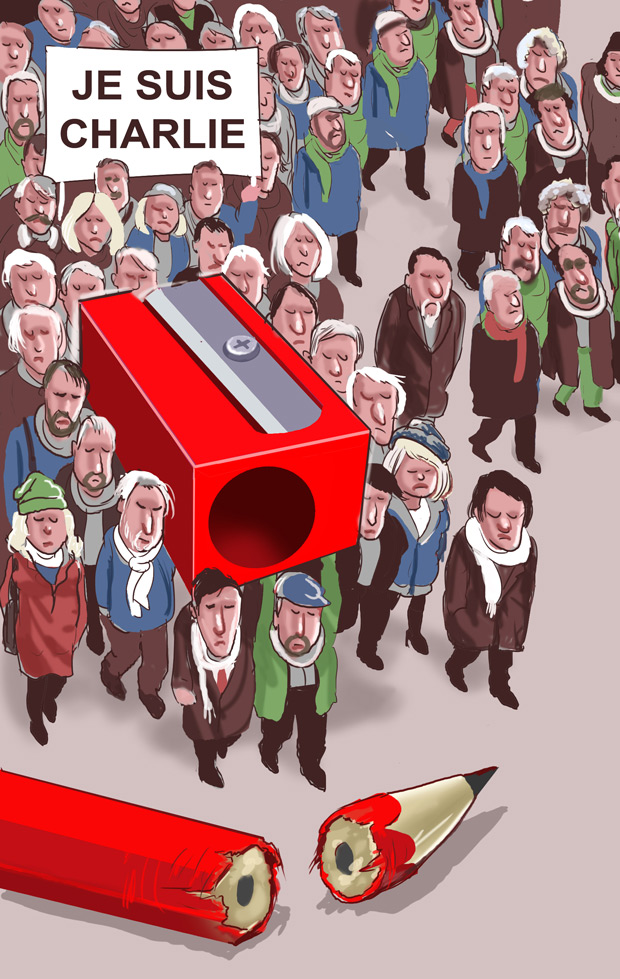
Cartoon courtesy Musa Kart
Kart told Index he feels “so sorry” and he has “lost his brothers” in last Wednesday’s brutal attack on the French satirical magazine’s offices, where 12 people — including cartoonists Stéphane Charbonnier aka Charb, Jean Cabut aka Cabu, Georges Wolinski and Bernard Verlhac aka Tignous — were killed.
Kart also ran into trouble with Turkish authorities back in 2005, when he was fined 5,000 Turkish lira for drawing then-Prime Minister Erdogan as a cat entangled in yarn. Kart puts the spotlight on Erdogan’s chequered history with cartoonists rights in a second piece, where the president declares that: “I condemn the attack. Ten years prison would have been enough for the cartoonists.”
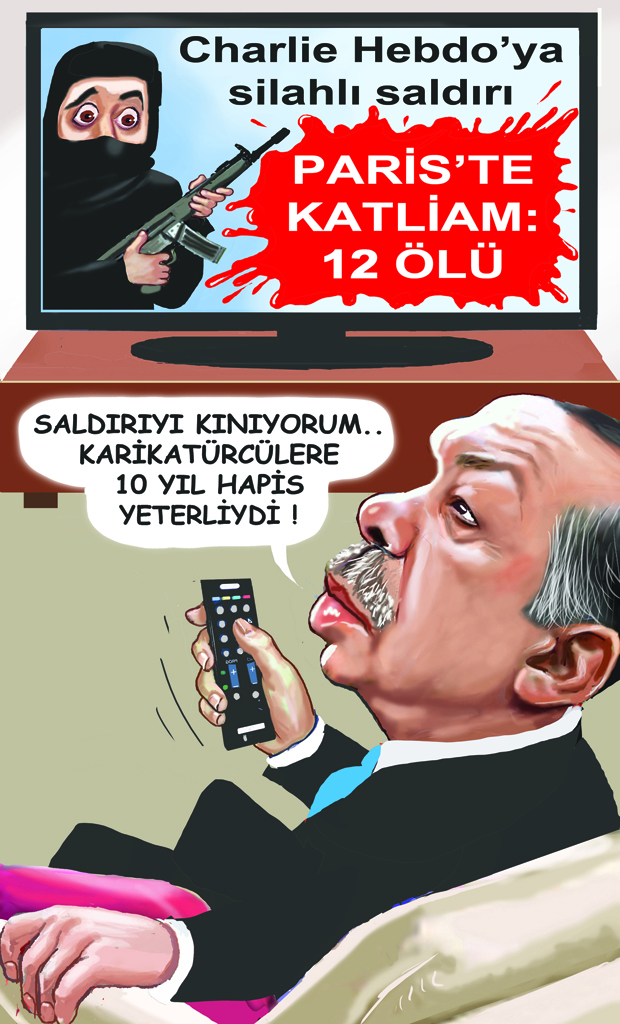
TV: “Massacre in Paris. Twelve dead.” President Erdogan: “I condemn the attack. 10 years prison would have been enough for the cartoonists.”
Erdogan condemned the “heinous terrorist attack” and Turkey’s Prime Minister Ahmet Davutoglu joined last Sunday’s march for unity in Paris. Much has been made of the apparent hypocrisy of world leaders who have suppressed free speech at home, taking part in what many considered a defiant show of support for that very right.
As Index CEO Jodie Ginsberg pointed out, Turkey imprisons more journalists than any other country in the world. Index’s media freedom map has received 72 reports of press freedom violations from Turkey since May 2014 alone. In the wake of the attacks in Paris, other Turkish cartoonists have been threatened by pro-government social media users. Police also raided the printing press of Cumhuriyet, as it prepared to publish selections from today’s issue of Charlie Hebdo.
Ecuadorian cartoonist Xavier Bonilla — known as Bonil — has also been targeted for his work. In 2013, the country got a new communications law which allows the government to fine and prosecute the media. After drawing a cartoon for El Universo, based on a raid on the home of a journalist and opposition advisor, Bonil became a victim of the new legislation. President Rafael Correa — who has been known to personally file lawsuits against critical journalists — ordered that a case be opened against the cartoonist. It found that his piece had invited social unrest and should be “rectified”, while El Universo was fined $92,000.
“I believe that humour is the best antidote to fear and the best defence against abuses of power. I have been drawing for 30 years, and I am not going to back down,” he wrote in an article in the current issue of Index on Censorship magazine.
Below are his cartoons in support of Charlie Hebdo.
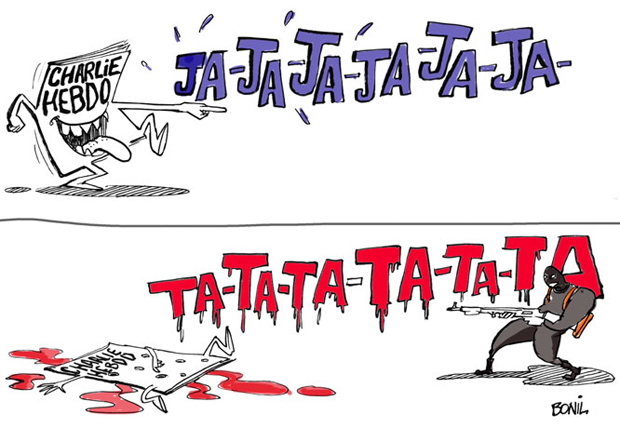
Cartoon courtesy of Bonil
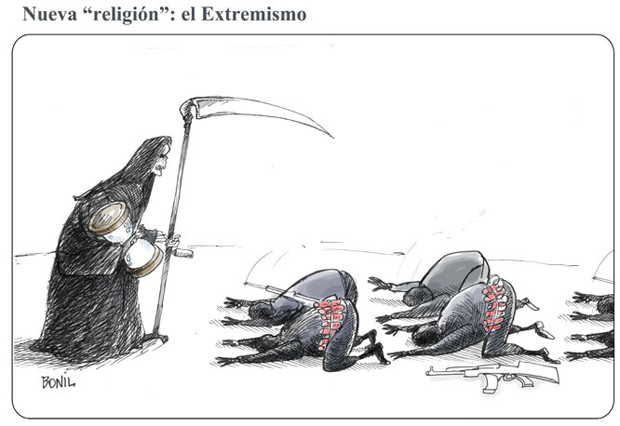
“New ‘religion’: extremism”
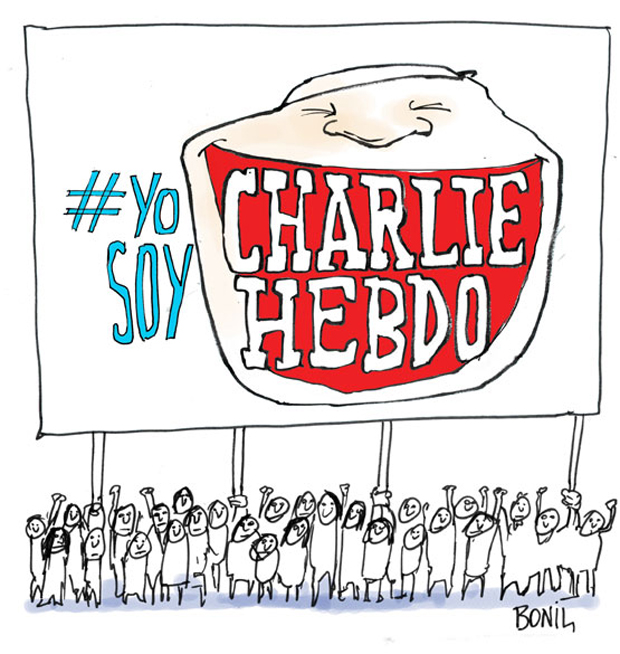
#IAmCharlieHebdo
This article was posted on 14 January 2015 at indexoncensorship.org

